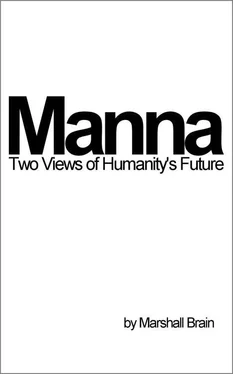For example, anyone with an artistic bent would start creating art, because they now have the time and the freedom to do it. Let’s say that you are, or have always wanted to be, a musician. You would get yourself the instruments and equipment you need to make music. It’s all available - just ask the robots and it is delivered to your door. There are thousands of options in the catalog. You would have the time and freedom to expand your talent. You could take classes, practice, hook up with other musicians, form a band and start performing.
In the same way, writers would start writing the books that they have always dreamed of writing. Inventors would work on their inventions, using materials and equipment provided by the robots. Scholars would do their scholarly research, finally free to study whatever they like, using the infinite intellectual resources available on the network. Scientists would start pursuing their scientific goals using research facilities provided by the robots. Dancers would get together and dance, and then perform. People who want to create films would pool their talents together and create them, or do them solo. The robots would provide equipment and studio space and let them have at it. Athletes would train and compete. Programmers would write the programs they have always dreamed about. Designers would design whatever they felt like, and then the robots would build it. There are people who are experts in their various fields — engine design, scrap booking, fusion reactors, needlepoint — and they would love to pass their knowledge on to other people. They would write books, make videos or have live lectures and workshops for people to attend. People interested in the martial arts would practice them every day. People interested in video games would play them every day. People interested in gardening would garden every day. The majority of people have a talent and, if they had the time, they would cultivate that talent and use it. The huge cruise ship known as Australia is the perfect place for every human being to reach his or her full potential.
It was fascinating to think about this and contrast it with the life I had known. In the U.S., everyone had to work, and in most cases “work” meant doing something that a rich person wanted so that the rich person could get richer. Thinking back to the jobs available at the turn of the century — you could work scrubbing toilets in a hotel, or you could flip burgers in a fast food restaurant, or you could restock shelves and check people out at a retail store, etc. — No one wanted to do any of these jobs. No one, as a child, ever aspired to scrub toilets or flip burgers or restock merchandise. But you had to earn money to live your life, and these were the jobs being offered to tens of millions of people. People had no choice but to take them, and in the process a rich person became richer. Then robots replaced those workers, and they ended up in Terrafoam.
In an economy like that, there were all sorts of musicians who wanted to do nothing but practice, write music and perform. There were programmers who wanted to do nothing but program their own creations. There were scientists who wanted to do cutting-edge research. These people did not care about money. They simply wanted to do what they do best. Getting paid for it was a necessary evil for these folks — they had to have a day job to pay the bills, and then when they got home from work at night they would indulge their real talents and their passions.
In Australia, these people could completely fulfill themselves, and humanity would be much better off because of their contributions. Creative people want to — need to — create. That is their passion. Instead of millions of talented people working in jobs that had nothing to do with their dreams, simply to make ends meet, in Australia they could follow their dreams.
The goal in Australia is to encourage and nurture creativity and innovation. This allowed, for example, there to be a nearly infinite array of clothing designs to choose from. A fashion designer — any person whose passion or lifelong dream involved designing clothes — would create a design and submit it to the catalog. If the design was worn by only three people, that was fine. The robots custom-made three copies of the design and delivered them. Or a design could be wildly popular and worn by millions. In that case, the designer gained a great deal of notoriety, won accolades and awards, and so on. This designer would appear in design shows and people would breathlessly await new designs. At the same time, another designer could have a very small group of passionate followers. Both designers had the chance to do their thing, and any new designer could break out into the mainstream at any moment simply by drawing something that caught the public’s attention. It meant an amazing level of creativity and innovation in every product category — food, housing, architecture, vacation resorts, restaurants, furniture. Whether it was basic research or final consumer products, innovation was everywhere. The innovators had the ability to take their research, their inventions and their ideas as far as they could.
The space elevators were a good example of a larger-scale process. Millions of people had said that they would gladly take a trip to a weightless hotel in orbit, and they were willing to contribute their credits up front to make it possible. With the credits available, the robots allocated the resources for research and design. Scientists, engineers and designers interested in the project worked on it simply to have a part in it and make it a reality. Then the robots built the space elevators to meet the demand.
When you thought about it, this made a lot of sense. For example, the American moon shot was one of the most innovative programs ever seen in the United States. Thousands of scientists, engineers and designers came together and worked 18-hours-a-day to make the moon shot happen. Did they do it for the money? No. None of them became millionaires. They did it because they loved it and believed in the idea. Einstein did not create the theory of relativity for the money. The Wright Brothers did not create the airplane for the money. Creative people create for the joy of it.
In other words, Australia was a permanent vacation resort for some of the residents. For creative people, Australia was an amazing intellectual playground. This meant that innovation was progressing at an astonishing rate.
Each day, robots cleaned my apartment, changed the sheets and so on. It was just like a luxury hotel. Food and drinks got delivered as requested. If I wanted room service Linda would order it. If I wanted to cook for myself, I could do that. If I wanted to eat out, Linda and I would go to a restaurant — there were thousands of them, all different kinds, scattered throughout the habitat. We would decide what we were in the mood for and she would take us right to the restaurant. Sometimes we could walk or ride a bike. Other times we took a car like the one that delivered us from the airport. The food and drinks were all essentially free because the robots were growing and processing all the food from free resources. This concept of “free” was just like on a cruise ship. Once you bought your ticket, everything was free on the cruise. This cruise just happened to last a lifetime.
At the end of the second day of orientation, we were told that day three would cover the Vertebrane system. Details on this system were sketchy, but I knew it had something to do with accessing the network and ordering things.
On the third day, Linda woke me as usual with her arrival. It was a very nice way to wake up in the morning.
“What’s on the schedule for today?” I asked.
“We are actually going to spend some time together today.” Linda said. “We are going to talk about the Vertebrane system.”
Читать дальше












